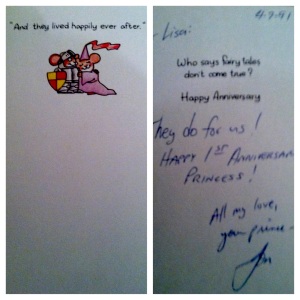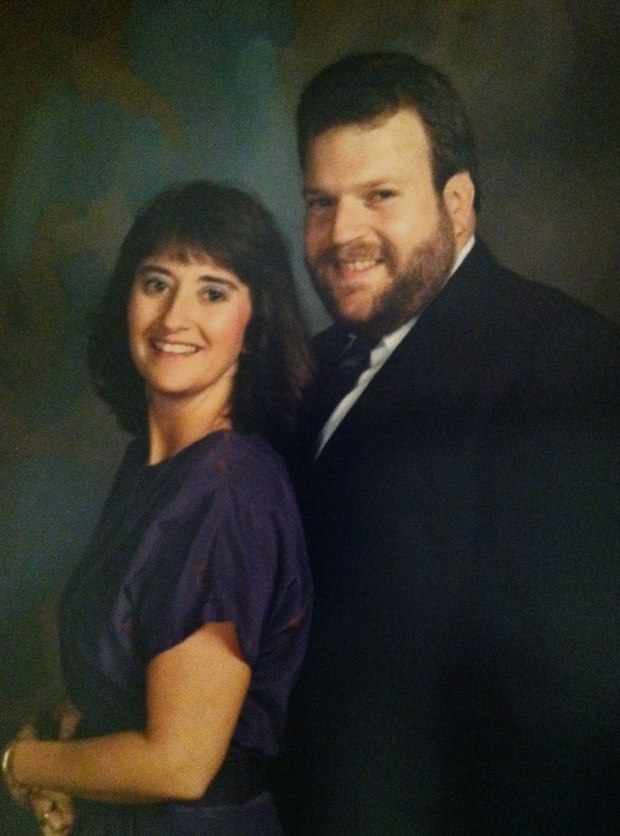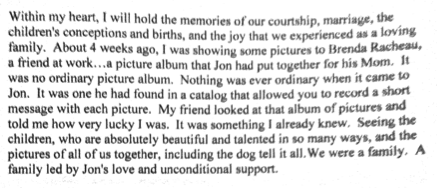Dear Friend,
I’m sorry you’re having to go through this, and more than anything, I hate that this is now a part of your life. While I don’t have magical words to make this better, here’s what I want you to know.
Maybe there’s a reason this happened. Maybe there isn’t. One day you’ll hopefully see good in the person you become or the life you live because of your loss. But today does not have to be that day. Because this sucks. It’s unfair. It’s hard. And it’s exhausting. Don’t diminish that.
Cry. Or don’t cry. Just don’t let those around you make you feel as if you’re supposed to be acting a certain way. There’s no recipe for grieving (but how great would it be if you could simply measure out a cup of tears, a spoonful of anger and a pinch of numbness to feel better?). Also, don’t worry about progressing through some framework or set of stages. Everyone is different. Just do what feels natural for you. Respond how you need to respond. Give yourself permission to grieve.
Ignore the stay strong’s. You are strong. You’re living through an unfathomable amount of pain. You’re reading this, which means you woke up this morning (yup, it’s important to celebrate the small victories right now). Being strong doesn’t mean that you keep it together. It doesn’t mean you have to hold back the tears or censor your reactions. It doesn’t mean that you have to give a tight-lipped smile and pledge to people that you’re OK. In fact, letting the tears out is one of the strongest things you can do. Grieving tip #87? Composure is overrated.
Know that there will be people around you who don’t get it. They can’t. In the same way that it is nearly impossible to adequately describe the pain you’re feeling, it’s difficult to relate to this unless you’ve been through something similar. So when someone says the absolute wrong thing, try to remember that he or she is inherently limited in his or her ability to relate. If you’re able, assume best intentions, because some of these people will be your closest friends. Remember, this is your experience and your reality. People tell you to “stay strong” because they want to believe that if this happened to them, they’d be OK. Likewise, when they tell you to “move on” or “get over it,” it’s because they want to believe that they’d be able to get over it if this were to happen to them – that it’d be like any other bothersome thing that fades.
From experience, I know that this next bit of advice can be hard to swallow, but it’s probably the best I have. Write down your memories. No really. Do it. A bullet list of thoughts will suffice. I know you think there’s no way you could forget a person you knew so well. But details fade. And maybe, at first, it will only be the small details – the ones you think may not be missed if they’re forgotten. But collectively, they add up. Ask friends and family to write down their memories too. You’ll be grateful for the collection of stories and remembered moments later.
I’m not going to lie to you and say you’ll eventually get over this. “Getting over it” is one of the greatest grief myths I’ve uncovered. The pain will never fully cease. It will, however, change and become less consuming. Years later, you’ll still have hard days, but overall it really does get easier. Remember, this is one of the hardest things you will ever live through. Emphasis on the live through, because you will get through this even though it doesn’t always feel that way.
So, find the things that make you feel even the tiniest bit better. Write. Listen to music. Talk. Run. Take a shower in the dark and cry. Scream into a pillow. Read. Or, create. Most importantly, let yourself sit in your emotions. Feelings are OK. They’re good. Whether you’re angry, sad, confused, relieved or even happy, it’s OK. These emotions you’re feeling? They mean you had something worth missing. It means the person you lost continues to hold your love. Celebrate that.
Oh and please don’t feel guilty when you have a day when you’re not consumed by thoughts about your loss or loved one. It doesn’t mean you love them any less. It doesn’t mean you miss them any less. It simply means that you’re starting to adjust to your new normal. So let yourself smile. Let yourself laugh. And, most importantly, let yourself live.
Lastly, even though it may feel like it sometimes, you are not alone. You probably won’t believe me until you find others who you feel can relate, but I hope you commit yourself (even if it takes a search party and smoke signal) to finding them. Until then, check out Hello Grief’s online community or do a quick Google or Twitter search for others. It’s worth it.
Sending you more good vibes than you can imagine,
Someone who’s been there
P.S. You’re going to be happy again. Promise.















